|
|
|
Sort Order |
|
|
|
Items / Page
|
|
|
|
|
|
|
| Srl | Item |
| 1 |
ID:
173788
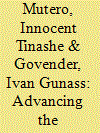

|
|
|
|
|
| Summary/Abstract |
This article frames a discussion on how South African universities and communities can co-create university spaces that facilitate repairing the country’s dented social, economic and political infrastructure through engaged creative-placemaking. The first section further explores the concept followed by a discussion of historical issues which have a material bearing on how universities can and should frame community engagement in South Africa. It pays close attention to how post-apartheid nation building is hindered by the remnants from the past and is dislocated to both the present and the future. The article also brings into question the type and role of leadership, in both universities and communities. The final section of the article presents a framework for engaged creative-placemaking delineating the antecedents that are needed by the key stakeholders, namely, public and private enterprises, university and the community to successfully work together in achieving a just society through creative-placemaking. Improving place liveability through engaged creative-placemaking has the potential to stimulate local economies and leads to cultural diversity, civic engagement and increased innovation.
|
|
|
|
|
|
|
|
|
|
|
|
|
|
|
|
| 2 |
ID:
169928
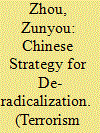

|
|
|
|
|
| Summary/Abstract |
China is fighting a tough battle against separatist terrorism perpetrated by militant Muslim Uyghurs in the far-western region of Xinjiang. De-radicalization is one of the policies the authorities in Xinjiang have recently taken to address the upsurge in terrorist violence. This paper consists of five parts. The first part deals with the background against which the de-radicalization strategy was conceived and developed. The second part discusses several major approaches to the strategy such as “five keys,” “four prongs,” “three contingents,” “two hands,” and “one rule.” The third part presents custodial, post-imprisonment, and social programs for targeting three groups of people: imprisoned radicals, released radicals, as well as those who are radicalized but not prosecuted. The fourth part describes programs for engaging communities in order to win over politically reliable people from civil society for support in de-radicalization. The last part draws a conclusion regarding the characteristics of, effectiveness of, controversies over, and future of the Chinese de-radicalization campaign.
|
|
|
|
|
|
|
|
|
|
|
|
|
|
|
|
| 3 |
ID:
096760
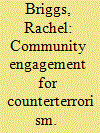

|
|
|
|
|
| Publication |
2010.
|
| Summary/Abstract |
This article explores the development of community engagement within the UK's strategy to tackle international terrorism linked to and inspired by Al-Qaeda, commonly known as CONTEST. It focuses mostly on the 'Prevent' strand of the strategy which seeks to prevent radicalization towards violence, reduce tacit support for violence, and increase the resilience of communities to tackle radicalization and extremist messages themselves. Community engagement for counterterrorism also relates to certain aspects of the 'Pursue' strand of CONTEST, and these are highlighted. The article outlines the case for a community-based approach to counterterrorism and outlines a number of the key developments in its emergence from 2005 onwards. It analyses the performance of this aspect of the counterterrorism strategy, pointing to a number of shortcomings in relation to the establishment of partnerships, the integration of the approach, capacity shortfalls at the local level, and the wider challenges of a hostile political and media environment. Written as the new UK coalition government announces a review of the 'Prevent' strategy, it offers a number of recommendations for the future direction of this area of policy. It calls for an overhaul in working styles, a focus on people rather than projects, and the need to draw a much clearer line between downstream and targeted 'Prevent' work and the broader and longer-term community development work, with the latter encapsulated within the government's Big Society Programme and aimed at all fragile communities, not just Muslims.
|
|
|
|
|
|
|
|
|
|
|
|
|
|
|
|
| 4 |
ID:
123608
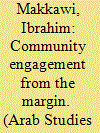

|
|
|
| 5 |
ID:
181734
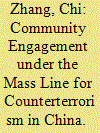

|
|
|
|
|
| Summary/Abstract |
The mass line principle offers an alternative approach to mobilize citizens to participate in governance. The key tenets of the mass line principle resemble that of the regime of community engagement, aiming at encouraging democratic participation, improving the trust between the rule and the ruled, and improving the ability of the government to gather intelligence. In the context of China’s counterterrorism strategy, the mass line involves the encouraging citizens’ participation in the People’s War on Terror, incentivizing individuals to provide tip-offs, and engaging patriotic believers, opinion leaders, grass-roots propagandists, and cultural workers to persuade and educate the masses to adopt “correct” views. In addition, the government seeks to publicize the voice of Uyghurs from within the community. However, such efforts only served as evidence for intolerance for diversity and an invitation for further suspicion and criticism. This article demonstrates the trust dilemma the state faces—in order to improve democratic participation, the efforts to engage a community and gather intelligence often result in eroding the trust. This article also highlights the importance of differentiating harmony and political conformity. Diversity per se is not the source of conflict, but it is often targeted by the state as it is desperately seeking to demonstrate efficacy in the face of terrorism.
|
|
|
|
|
|
|
|
|
|
|
|
|
|
|
|
| 6 |
ID:
104886
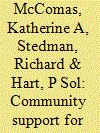

|
|
|
|
|
| Publication |
2011.
|
| Summary/Abstract |
Across the United States, universities are grappling with challenges associated with adopting approaches to more sustainable energy use. One approach has been to develop energy-related projects in their local, host communities. Because host communities can play a major role in the successful planning and implementation of these projects, understanding the factors relating to their support is important. Building on research that suggests that procedural fairness is one such key factor, this study examines community members' support of six approaches a local university could implement to work towards a goal of carbon neutrality. The results of a mail survey (N=677) found that perceived fairness of campus decision makers was significantly related to community support for the proposed approaches; however, beliefs about the efficacy of the different approaches to address challenges associated with climate change had the strongest relationship with support. The results also suggest that residents prefer changes in the energy infrastructure, such as the development of wind power, over the purchase of carbon offsets. We discuss the results in terms of actions that universities may take to foster community engagement in decision-making for university-sponsored sustainable energy projects.
|
|
|
|
|
|
|
|
|
|
|
|
|
|
|
|
| 7 |
ID:
148377
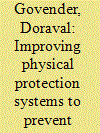

|
|
|
|
|
| Summary/Abstract |
Security risk control measures may take the form of physical protection systems, strategies and/or actionable crime information products. This article explores the role played by physical protection systems (PPSs) in preventing residential burglaries. It is important that such systems be properly designed and timeously evaluated. The study on which this article is based seeks to assist communities in the prevention of residential burglaries. The primary aim of this article is to improve PPSs to prevent residential burglaries. A community-based participatory research approach was used to collect data via informal and in-depth individual interviews and observation. Data analysis involved the descriptive analysis of responses and observation field notes. The results suggest that perpetrators gain unlawful entry during the night or the day, mainly in the absence of the occupants, by penetrating, bypassing or damaging perimeter fencing, windows and/or burglar bars without being detected. Based on these findings, it is recommended that PPSs be effectively designed with an objective in mind and regularly evaluated for vulnerabilities.
|
|
|
|
|
|
|
|
|
|
|
|
|
|
|
|
| 8 |
ID:
189479
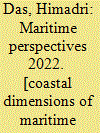

|
|
|
|
|
| Publication |
New Delhi, National Maritime Foundation, 2022.
|
| Description |
viii, 275p.pbk
|
| Standard Number |
9788195907908
|
|
|
|
|
|
|
|
|
|
|
|
Copies: C:1/I:0,R:0,Q:0
Circulation
| Accession# | Call# | Current Location | Status | Policy | Location |
| 060329 | 359.54/DAS 060329 | Main | On Shelf | General | |
|
|
|
|
| 9 |
ID:
101451


|
|
|
|
|
| Publication |
2010.
|
| Summary/Abstract |
Over the last decade the important role that local authorities can play in catalyzing community action on climate change has been repeatedly emphasised by the UK Government. The paper examines this policy context and explores the options available to local authorities in terms of reaching and engaging their communities. The type of progressive response shown by some UK local authorities is illustrated with empirical evidence gathered through a study conducted in the London Borough of Islington focusing on their recently established 'Green Living Centre'. The results confirm interest in this major council-led community initiative, with positive attitudes expressed by the majority of those questioned in terms of the advice and information available. However, it is also clear that many participants had preexisting pro-environmental attitudes and behavioural routines. Results from a broader sample of Islington residents indicate a substantial challenge in reaching the wider community, where enthusiasm for sustainability change and interest in this type of scheme were more mixed. The prospect for local government in addressing this challenge - and their ability to trigger and capitalize upon concepts of social change at the community level towards a lower carbon future - is discussed in the final part of the paper.
|
|
|
|
|
|
|
|
|
|
|
|
|
|
|
|
| 10 |
ID:
182465
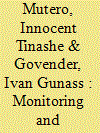

|
|
|
|
|
| Summary/Abstract |
The study argues that the value of arts-based interventions in peacebuilding and development is yet to be fully realised due to a paucity of effective monitoring and evaluation models. In a context of growing attention to the benefits of university community engagement to social change, this article reports on how social practice creative placemaking embedded in engaged scholarship can be assessed for efficiency and its effectiveness in giving salience to silenced and ‘unusual’ voices in the pursuit of social justice. We propose an effective monitoring and evaluation model that shows the change development processes and can track and attribute causality.
|
|
|
|
|
|
|
|
|
|
|
|
|
|
|
|
| 11 |
ID:
168662
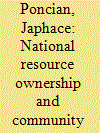

|
|
|
|
|
| Summary/Abstract |
Extractive resources politics in many resource rich countries remain contentious due to complex relations between resource owners on the one hand and the investors on the other hand. Recent policy reforms in Tanzania have been enacted to bring the development of energy resources under the control of the national government. The impact of these policy changes on the politics of participatory resource governance in terms of local community engagement in decision making and governance processes has not received much scholarly attention. This paper explores how the government's policy of national ownership shapes community engagement in decision making processes in the gas rich regions of Mtwara and Lindi. The paper draws on government documents, media reports as well as interviews with local communities, local government leaders and officials and central government officials. It argues that the policy framework for national ownership of natural gas is used by the government to thwart grassroot community initiatives for participation in decision making processes.
|
|
|
|
|
|
|
|
|
|
|
|
|
|
|
|
| 12 |
ID:
137737


|
|
|
|
|
| Summary/Abstract |
In Australia, renewable energy is under pressure in the context of a highly politicised debate about how to act on climate change. The recent repeal of an established carbon tax has seen the defunding of significant renewable energy initiatives and a controversial review of the national Renewable Energy Target is threatening key drivers for investment in renewable energy. The current regulatory focus on community ‘acceptance’ does not facilitate the active community support necessary to challenge this increasingly hostile policy context.This research considers current experiences of community engagement in wind farm governance in one Australian jurisdiction. Through documentary analysis and two qualitative case studies, it examines legal and non-legal requirements for community governance mechanisms and considers how these influence wind farm development in rural areas. Findings include a problematic reliance on procedural compliance in assessing wind farm consultation, domination by vested interests, and reduced expertise in community engagement at the time it is needed most. Recommendations include integration of best practice guidelines in current regulation; harmonisation of policy settings to ensure equity across energy sectors; and an evidence-based commitment to benefit sharing as a strategy for increasing community support of rural wind farm development.
|
|
|
|
|
|
|
|
|
|
|
|
|
|
|
|
| 13 |
ID:
122480
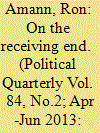

|
|
|
|
|
| Publication |
2013.
|
| Summary/Abstract |
Based on direct observation over a five-year period, the article paints an intimate picture of how the police in Britain are governed. It analyses the complexity of the economic and political environment in which the police have to work: the insecure funding platform; the stream of initiatives, targets and official guidelines; the delicacy of handling community sensitivities; the inherent opaqueness of the national 'tripartite' system of governance; and the constant challenge of making balanced judgements under conflicting pressures. The central theme that runs through the article (which follows on logically from two previous articles published in Political Quarterly) is that of a 'managerialist' political class, with a distinctive ideology and mode of control, trying to get a policy grip on the real world of service delivery: in this instance, policing. Unlike the previous two articles, which had a top-down focus, the emphasis here is primarily on how the thicket looks to those who have to navigate their way through it.
|
|
|
|
|
|
|
|
|
|
|
|
|
|
|
|
| 14 |
ID:
166964
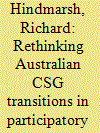

|
|
|
|
|
| Summary/Abstract |
In public participatory contexts, at a time of policy crisis, this paper explores the enduring contestation, and associated policy responses to such contestation, regarding controversial coal seam gas (CSG) well siting in Australia's CSG development States of Queensland, New South Wales, and Victoria. Participatory deficits are well identified in the Australian literature on the “CSG debate” and subsequently in our analysis of (participatory-associated) policy responses to the CSG debate. Highlighted are concerns around inadequate community engagement involving inequitable power relations between communities and CSG companies, CSG project information deficits and community disrespect, and deficit State CSG regulations. The findings show that policy responses have been more supportive of CSG developers and development than “challenger” issues. Consequently, enduring local social conflict has resulted, and overall, transitions to cleaner energy pathways to meet climate change policy obligations have become “messy”. Overall, CSG development reflects a significantly dysfunctional, “decoupled”, socio-technical energy development system, especially regarding social concerns. Accordingly, participatory remedies are posed on how policymakers can better engage with the concerns of communities and citizens in the broader context of multi-functional and multi-stakeholder energy/landscape conflicts, to better address these conflicts and ensure more effective cleaner energy transitions.
|
|
|
|
|
|
|
|
|
|
|
|
|
|
|
|
|
|
|
|
|